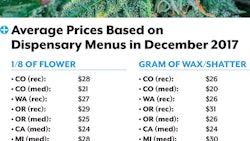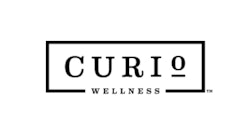
While medical and adult-use states continue to develop quality assurance (QA) standards for marijuana edibles, unsafe edibles are often unwittingly being sold to and by dispensaries. A 2017 University of California-Davis study of medical marijuana flower from Northern California dispensaries found samples containing multiple bacterial and fungal pathogens, including Escherichia coli (E. coli), Mucor and Cryptococcus, among others. If unsafe flower is being found in the marketplace, chances are it is winding up in some edibles products. And even if the flower is not tainted, you still run the risk of having a product made with sub-par ingredients or in an unsanitary environment.
The federal government still classifies cannabis as a Schedule I narcotic, thus no national food safety standards exist—only “best practices” from other states, says Nick Mirsky, operating specialist for Ann Arbor, Mich.-based medical marijuana consultancy TreeCity Consulting Group. “The World Health Organization (WHO) does have some standards that are used in Europe, but have yet to be adopted here in the U.S.”
Since cannabis is not recognized by the Food and Drug Administration (FDA) as a legal product, “it is up to individual states to develop their own standards for safety as they legalize products in their state,” says Cindy Rice, consultant at Boston, Mass.-based Eastern Food Safety.
So how can a dispensary ensure that the edibles it is sourcing and selling are of the highest quality, safe for its customers and follow state regulations? Below are five factors to consider.
1. Food Safety
Food safety should be the top priority for every business throughout the edibles supply chain, even if specific state standards are still being developed. “Just because you’re in the cannabis industry doesn’t mean you shouldn’t be guided by food-safety principles in general,” says Jason Cetel, senior associate at Gray Robinson Attorneys at Law in Tampa, Fla. Although some dispensaries don’t control the cultivation and production of pre-packaged edibles, “it’s really important for the dispensary to know that they are in the food supply chain—and they are the last link in this long chain,” Cetel says.
Dispensaries have a responsibility to understand the supply process, to know who their vendors are, what food-safety and -quality measures are being followed, and what ingredients are being used.
At the same time, the dispensary must ensure it is following safe-handling practices. “Is there anything in that food that should require food safety?” Cetel poses. For example, is it shelf-stable or does it need low humidity, refrigeration or freezing? “You are selling food, so what are the industry standards that guide that food? There’s a major liability if you’re not selling safe food,” Cetel says.
Mirsky sees proper storage and care, attention to sell-by or expiration dates, and independent testing and verification from reputable sources as vital elements to edibles’ safety. In addition, he notes, “Although not required, I would believe standard ServSafe certifications should be earned by those in the manufacturing environment,” adding that those operating in this space should adhere to the FDA’s Current Good Manufacturing Practices (CGMPs) regulation for food. (For more information on ServSafe, visit ServSafe.com; for more on CGMPs, visit bit.ly/foodCGMPs.)
Dispensary record keeping is necessary to document supplier, batch numbers, dates and product types, Rice says. Additionally, to help consumers continue the chain of food safety, the dispensary should provide instructions for safe handling of the products, including directions for shelf life, storage conditions, dosages and recommended use, she adds.

2. Accurate Labeling
Whether edibles are packaged and labeled in-house or prepackaged from a supplier, labeling is a critical food-safety factor—and one Rice believes should follow FDA requirements, despite cannabis’s Schedule I status.
Important items on a label include an ingredients statement, list of allergens and dosage information of active cannabinoids, Rice says. “Packaging should meet standards for food, and suppliers/processors should be sure that it is food-grade,” she adds.
According to Mirsky, labeling should have company information, including notation that it’s an officially and legally licensed business whose products have been properly tested. This type of labeling will become a requirement in most states with medical and adult usage, Mirsky says, adding that “labels will and should have unique identifiers, so if an issue does occur, a recall can be issued and performed in a manner that is consistent with any other product where consumer safety may be affected.”
If you don’t verify your suppliers’ food-safety practices, require that your distributor be licensed and check your labels. You can be held liable in the event of a contaminated product reporting or recall (if proper label requirements weren’t displayed on the product), Cetel says. “The dispensary owner is in the supply chain. Just because you’re not putting on the labels, you still have to be knowledgeable about what you’re selling.”
“Just because you’re in the cannabis industry doesn’t mean you shouldn’t be guided by food- safety principles in general.” Jason Cetel, senior associate, Gray Robinson Attorneys at Law
3. Lab Testing
“Lab testing is important for consistency and purity,” Mirsky says. But, he adds, a common issue with current testing is that samples are not randomly selected, but are specifically chosen by producers/processors. “This can be skewed information, as the sample may not be representative [of] the batch/harvest.” Michigan, for example, requires batch testing on all products, Mirsky says, but requirements vary by state.
Despite that variance, Rice says, “Lab testing is important for food safety, notably for presence of pesticides, microorganisms, heavy metals and for dosage control in edibles.”
If a consumer becomes sick or injured because he or she consumed a product that contains pesticides, fungicides or molds, or even glass shards from the manufacturing process, there could be legal repercussions for everyone in the chain, according to Cetel. “In litigation, the plaintiff will inevitably sue everyone. Everyone is a potential defendant until you can prove otherwise,” Cetel says.
4. Ingredient Consistency
Consistency concerns arise again when discussing ingredient quality, particularly in source strains, potency and THC/CBD content between batches, Mirsky says, adding, “One of the main issues with edibles is that the dosage may not be consistent throughout the batch, i.e., not evenly distributed.” Pooling can occur, he explains, with one piece from a batch more potent than another from the same batch, so testing should be performed.
Consistency needs to be addressed by the grower and manufacturer. As such, the dispensary should set supplier requirements. “From seed to sale, the product needs to be controlled in its growing and production so that potency is consistent, ingredients and hazards are controlled, and labels are accurate regarding these aspects,” Rice says.
One requirement the dispensary could make is that of a Hazard Analysis and Critical Control Points (HACCP) plan, which Rice says would help identify possible hazards throughout the growing and processing stages, and help “prevent, eliminate or reduce hazards to safe levels every step of the way.” (For more information on HACCP plans, visit the FDA’s website: bit.ly/HACCP-info.)
“In litigation, the plaintiff will inevitably sue everyone. Everyone is a potential defendant until you can prove otherwise.” Jason Cetel, senior associate, Gray Robinson Attorneys at Law
5. Proper Training
No matter how many practices you put in place—within the dispensary or for your suppliers—they likely won’t matter if your staff isn’t trained. Training should include food safety, checking and assuring label compliance and effective dates, communicating with customers and regulatory departments, and what to do in case of customer complaints or illness, and damaged or recalled products, Rice says.
“Education is very important for the dispensary to understand its supply chain, what they are selling and convey that information to the staff, so they can inform the customer,” Cetel says.
Retail's Onus
It comes down to "must" versus "should." Due to cannabis's Schedule I status, the FDA may not be able to regulate edibles production, and many factors of edibles food safety and quality begin further back in the supply chain. But the dispensary, as the last link in the chain before consumer consumption, is legally and ethically liable for the products it sells. “Just because you’re in the marijuana space doesn’t mean you’re absolved from all liability risk,” Cetel says. “Don’t just bury your head in the sand and say you’re not regulated.”

























